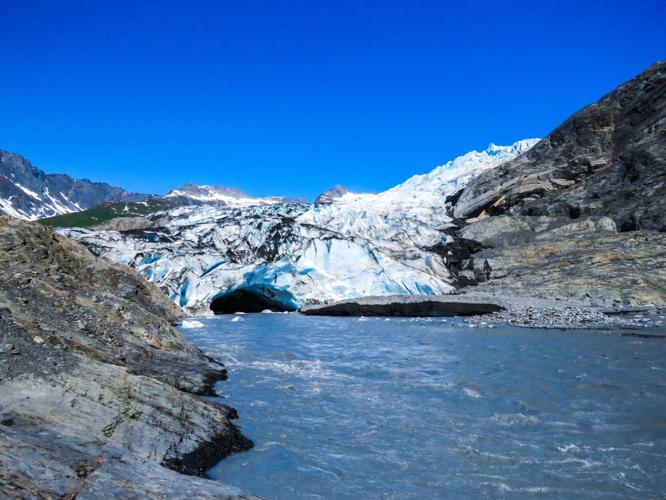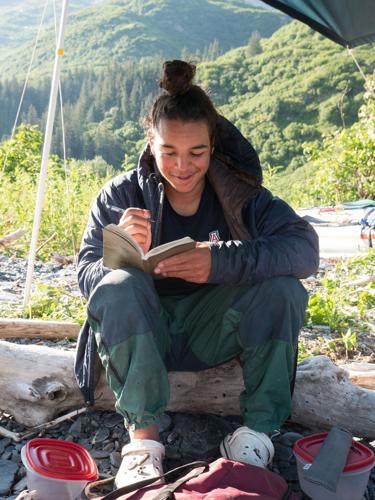When Calvin Simmers started his senior year at Rincon High School last week he already had a list of colleges he’s ready to apply to.
Johns Hopkins and the University of Rochester are at the top — he’s musically inclined and both have excellent music programs. But Simmers, who will be the first person in his family to attend a four-year university, did not always have the confidence to imagine himself attending a top-tier college across the country.
He credits his college readiness in part to a program called STEP, which stands for student expedition program.
Building confidence
For more than 15 years, the Arizona-based nonprofit has focused on helping first-generation and low-income high schoolers prepare competitive college applications while building their confidence to make a successful transition into higher education.
One way STEP does that is by taking students on Alaskan wilderness expeditions, which is made possible through a partnership with the National Outdoor Leadership School.
The expedition “gives you that idea that wherever you go, it’ll be fine because Alaska was the craziest it can be,” said Simmers, who recently returned from a three-week sea kayaking expedition in Alaska. “It kind of gets you more comfortable with just being away and in unfamiliar places.”
The program set off for its first expedition in 2005. Since then, STEP has sent 400 students on 34 NOLS expeditions.
Although the expedition is the highlight of the STEP experience, there’s about two years of lead-up before students start packing their bags.
The program works with high school counselors to identify and recruit low-income students who have a track record of academic excellence and want to go to college. Students apply before their sophomore year of high school, and write several personal essays that allow STEP recruiters to get to know the candidates.
According to its website, 90% of STEP students qualify for free or reduced-price lunch, 91% identify as racial and ethnic minorities, and 99% are first-generation college students.
Once they are admitted, STEP provides full guidance inside the classroom, taking students through every step of the college application process, starting with which courses to take that will stand out to college admissions officers. Students are given deadlines to complete tasks, such as compiling a list of colleges they’re interested in or researching financial aid.
The program also has an emphasis on exposing students to options beyond community colleges and in-state universities. While out-of-state schools can be pricey, STEP only partners with higher education institutions that offer full financial aid packages to low-income students.
Some of these happen to be big-name, prestigious schools like Dartmouth, the University of Pennsylvania and Washington University in St. Louis.
All of those elements combined have produced excellent results for the students who participate in STEP — 96% are either in college or have a college degree.
‘A powerful experience’
Tracy Baynes, founder and CEO of STEP, said it’s the trip into the wilderness that gives students an added boost they may not get from other more traditional classroom-based college prep programs. “It’s a really powerful experience,” she said. “The students come back with a lot of confidence.”
Each summer, STEP sends three groups of about a dozen students on these Alaskan expeditions, which are led by NOLS instructors, to either sea kayak in Prince William Sound or backpack through the Talkeetna Mountains. Students participate in team building workshops and outdoor education classes to learn how to survive in an environment far different from the Arizona desert.
“It takes courage to step into the unknown and remove yourself from our daily lives. There’s a lot of comforts and amenities that we have at home that on expedition you don’t have access to,” said Lynn Petzold, a senior instructor and account manager in custom education for NOLS. “It’s an added layer of challenge of stepping into the unknown because going to college for anybody, especially if you haven’t had parents that can coach you through some of these things, the parallel of coming to Alaska to the unknown, works well for them going to college.”
That’s how it worked for Alexis Rosales, who graduated from South Mountain High School in Phoenix in 2017 and has since graduated from Smith College in Massachusetts.
“It was really cool to be able to know how to read a map, especially on water, because that’s not something that you get to do in Phoenix really,” said Rosales, who enjoyed her experience with STEP so much that she now works for the organization.
Going on the expedition is what solidified her decision to pursue college out of Arizona.
“I wanted to keep pushing myself to be the best version of myself and to keep wanting these new experiences that I probably would not be able to find in Arizona if I just stayed close to home.”
Teamwork, leadership
And with each summer that passes, a new group of ambitious students finds clarity about what they want out of college — and beyond.
While the students learn a lot about teamwork, they also learn how to lead a group through the responsibility of being the designated leader at least once during the last two weeks of the expedition. In that role, they decide what time everyone wakes up, when they eat breakfast and when they need to pack up camp in order to be at the next destination safely and on time. They also consider weather and ocean movements to efficiently travel across the sea.
“You’d be under supervision from the instructors, but they really let you have to take on responsibility and to work for the team’s success,” said Simmers, the senior at Rincon who just returned from Alaska in July.
If he does end up going to college out of state, like so many STEP students do, he’ll be able to draw on his experiences this summer to carve out his niche in another unfamiliar environment.
“The whole team-building and leadership aspect of NOLS is really good for understanding how groups work and how to work together because I think that’s a big part of going into new communities,” he said. “There’s a comforting feeling of being more comfortable in situations that maybe you didn’t before.”






